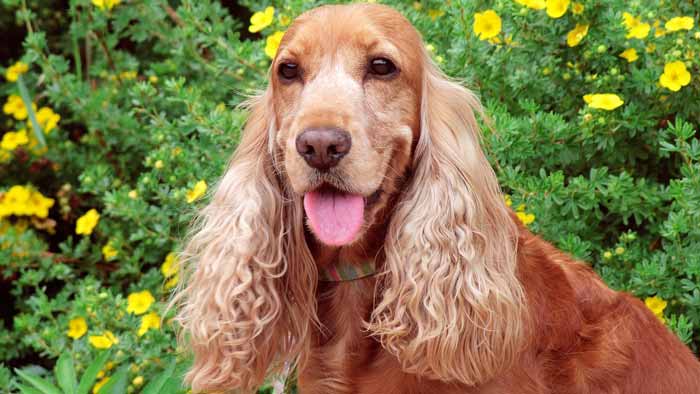If you’ve seen the movie Lady and the Tramp, you know just how charming Cocker Spaniels can be. Their endearing faces may be irresistible, but are Cocker Spaniels good family dogs?
The answer is yes, Cocker Spaniels are good family dogs. Especially if they’re socialized from a young age. It is a very cheerful, gentle and easy-going dog breed that gets along well with children. They tend not to be aggressive towards other animals or people.
Read ahead to find out everything you need to know about this gentle breed. We’ll also talk about some of the benefits and drawbacks of being the proud owner of a Cocker Spaniel.
Let’s dive in!
Why You Should Get a Cocker Spaniel for Your Family
If you’re looking for a lovable dog for your family, you won’t find any better than the Cocker Spaniel. They’re known to be happy dogs because their tails are always wagging.
Their gentle nature is why they’re perfect for first-time dog owners. It’s also what makes them great for anyone looking for a well-tempered family dog.
Cocker Spaniels are cheerful dogs that will spend a great deal of their time trying to please you. They’re always eager to learn and adapt to their surroundings.
Another reason why spaniels make good family dogs is that they’re a gentle breed. Their sweet disposition means you can trust them with your kids.
If you’re going to adopt a Cocker Spaniel, you must choose a trustworthy Cocker Spaniel breeder. They’ll have more experience with this breed and be able to answer any questions you may have.
Avoid getting your puppy from a puppy mill, also known as puppy farms. They’re not qualified in breeding dogs and often disregard genetic quality. This can result in weak or unhealthy puppies.
That said, let’s go over some of the most notable benefits and drawbacks of adopting a Cocker Spaniel.
Pros
- Intelligent and clever
- Lively nature
- Beautiful, silky coat
- Gentle and loving temperament
- Easily trained
Cons
- Separation anxiety
- Shedding
- An inclination to trickle urine when nervous or excited
- A wide range of severe health problems
Caring for Your Cocker Spaniel
Cocker Spaniels easily take to their environment, whether it’s in the city or countryside. They only ask that you take them out for about an hour each day to get some exercise and fresh air.
You’ll also notice that they enjoy your company immensely. Your constant attention and affection are another one of their big asks.
To properly care for your soon-to-be-adopted Cocker Spaniel, you need to learn about the dog’s nature and characteristics, from its physical traits and temperament to its diet, grooming, and so forth. Read ahead to learn more about the Cocker Spaniel breed.
Physical Traits
The Cocker Spaniel is a medium sized dog breed that, on average, can reach 15 to 16 inches. Their weight can be anywhere between 24 and 28 pounds.
They come in a variety of colors, including tan, golden, white, red, black, and white. Some even have a mix of several colors in their coats.
Whichever color your pooch displays, it’ll be glistening and flowing. Another unique Cocker Spaniel feature is their long, floppy ears, and ever-wagging tail.
Cocker Spaniel Temperament
The Cocker Spaniel is a highly intelligent dog breed. Their cleverness and lively nature make them easy to train.
Their friendly, sociable nature is both a blessing and a curse. Being so willing to bond, Cockers are known to be a lively, playful breed.
Cocker Spaniels can’t handle going more than 24 hours without their daily exercise. Yet, they’ll have just as much fun enjoying your company inside the house, playing with the kids, or curled up next to you on the couch.
Another thing Cockers love is to be involved in everything the family is doing. They can’t stand being left out. They want in on the action!
That may make for a cute and adorable family dog to have in your home. Their love of people makes them one of the worst ever guard dogs!
Exercise

The Cocker Spaniel is a hunting dog at heart. This is why they’re so good at retrieving balls or flying discs. Don’t be surprised if your pooch starts chasing a bird or small animal when you’re on one of your walks.
If you’re taking your dog out somewhere with no fences, it’s recommended you keep them on a leash to ensure its safety and to prevent potential mishaps.
On a leash or not, Cocker Spaniels crave physical exercise every single day. It boosts their physical strength and manages their weight.
Plus, daily exercise will make your Cocker cheerful and in a good mood.
The best time to encourage early socialization is when your Cocker Spaniel puppy is six months or younger. It gets them used to being outside around people and other dogs.
However, their playtime should never reach a point of exhaustion. In other words, around 30 minutes of daily outside play should be enough for your puppy.
Adult Cocker Spaniels, on the other hand, will need a bit more than that to satisfy their lively nature. You can take your adult dog on an hour-long walk or divide them up into two 30-minute walks; it’s up to you.
This is not including their free playtime outdoors in a secured, fenced area like your backyard or a park.
Separation Anxiety
They also hate being left alone. Separation anxiety is one of the biggest problems you’ll face as a Cocker Spaniel owner.
If you leave your Cocker anywhere between two and four hours at a time, he’ll quickly let you know just how upset he is. One way is by barking. When that happens, your neighbors will tell you all about it.
Another way is by finding something that keeps them entertained. You can put out a collection of toys, like chewy, squeaky, and plush toys.
Another great toy is one that doubles as a snack dispenser to keep your pooch engaged until you come back home. To engage its inquisitive nature, get your Cocker Spaniel an interactive puzzle toy.
If you don’t provide entertainment, your dog may find something on its own to occupy its time with. This may consist of chewing, nibbling, and scratching your furniture and belongings. You don’t want that, do you? Remember that this behavior is a result of boredom, not disobedience.
Diet
To keep your Cocker Spaniel healthy, slim, and in good shape, you have to provide a well-balanced, nutritious diet. The amount depends on your dog’s age, which your vet will guide you through.
8 to 12-week-old puppies can typically eat three or four times a day. Because of their higher energy needs, puppies foods that are rich in nutrients compared to adult Cockers.
Then, starting at around six months, you can cut back the number of daily meals to around two.
Since the Cocker Spaniel dog breed is in the weight range of 24 to 28 pounds, experts recommend giving them ¾ to 1.5 cups of dry food per day. They also need more protein-rich foods because they’re active and energetic.
Each dog is different, even those who are of the same breed. So, start by giving yours 1.5 a cup each day. If it’s too much, your dog will let you know by leaving some in his bowl. If there’s still food in your Cocker’s bowl after 20 minutes, take it away.
Feed your pooch at the same time each day. It’s the best way to develop a healthy eating routine. Also, avoid providing a full meal before or directly after exercising.
Don’t forget to include treats and snacks in your dog’s daily intake. Treats should make up no more than 10% of your dog’s daily calorie intake to ensure a healthy lifestyle.
Grooming
Grooming Cocker Spaniels can be high maintenance compared to grooming some other dog breed. Yet, it’s worth it to keep that silky, soft coat looking and feeling great.
Brushing has to be done daily to prevent tangles and control shedding. The best type of brush to use is one that helps remove mats and tangles from your Cocker’s fur.
Since you’ll be brushing your dog’s hair every day, you want something that doesn’t cause wrist fatigue. Find one with an ergonomic handle for added comfort.
The best time to give them their daily brushing is after their daily walk. This helps prevent their fur from tangling. Plus, it helps get rid of any dirt and debris stuck in their fur from playing outside.
Then, for more thorough grooming, you’ll need to take them to a professional dog groomer every 4 to 6 weeks. This will keep your Cocker’s fur in good condition. It’ll also reduce the risk of diseases and infections.
Bath Time
Cockers need a bath every two months or so in the summer and about every four months in the colder months.
However, if your pet is dirty from playing outside or jumping into a mud puddle, an immediate bath is mandatory.
Make sure to use a shampoo with natural ingredients to keep your dog’s coat silky smooth. A good shampoo can also moisturize the skin and help treat and manage skin diseases.
Common Health Problems

Cocker Spaniels can live to the ripe old age of 15 years. Yet, with old age comes a variety of health problems. Some of the most common health problems a Cocker Spaniel may suffer from include:
- Heart failure
- Kidney failure
- Cancer
- Progressive retinal atrophy
- Hip dysplasia
- Ear infection
- Eye problems
Food Allergies
According to veterinarians, Cockers are easily susceptible to food allergies. This may show up as itchiness in their feet or ears.
If your pet suffers from any allergies, it’s important that you try and find the source. When you do, your veterinarian may recommend certain specialized food.
You can also limit your dog’s diet to simple meals of just protein and starch. Then, add one new food product every month until you can get to the root of the problem.
Some of the common foods that cause allergies are:
- Chicken
- Beef
- Corn
- Soy
- Wheat
- Milk
- Eggs
Obedience Training
Training puppies is one of the best ways to ensure they remain gentle, obedient, and loving. Formal dog training should start once your Cocker Spaniel is about six months old. Before that, you can begin basic obedience training as early as eight weeks.
Yet, what if you adopt an older pooch? And what if you don’t have the time to train your Cocker puppy?
Luckily, there are many competent and trustworthy professional dog trainers out there. They have the know-how to help your dog become the gentle, family pet you’ve always dreamed of.
Whether you train the dog yourself or get a professional to do it, make sure you rely on positive reinforcement for best results. Also, keep each training session between 5 and 10 minutes.
It’s a good idea to get your children involved with the puppy’s obedience training so that it’s able to take commands from your kids. Plus, it’ll teach your kids how to be firm yet gentle with their pooch.
It’s worth mentioning that young pups are known for their short attention spans. So, you’ll find yourself repeating simple obedience commands several times until they get the hang of it.
There are seven basic dog commands that a Cocker Spaniel in their young adulthood must know. These include:
- Sit
- Stay
- Come
- Heel
- Down
- No
- Off
Quick Training Tutorial
The following is a simple tutorial on how to train your puppy to sit.
- Take a treat in your hand and let your pup know what you’re holding.
- Hold the treat in front of your puppy’s nose.
- Move your hand up and down.
- Encourage your pup to follow the treat until he sits.
- Once your dog sits, say the word ‘sit’ out loud.
- Give your dog the treat and praise him with a pat on the back and a hug.
- Repeat these steps several times each day until he masters this simple skill.
Potty Training
Cocker Spaniels are known to be excellent at paying attention. However, when it comes to potty training, they may not be as alert.
This is where you’re going to need all your patience. You’re going to have to wash, rinse, repeat quite a number of times until your Cocker Spaniel gets the message. Being consistent in your training will get you the best results.
Remember to always use positive reinforcement. Avoid hitting, scolding, or yelling at your pet. He’ll eventually understand that he must do his business outside.
Final Thoughts
So, is the Cocker Spaniel a good family dog? Yes, they are.
All it takes is proper training combined with a great deal of love and attention. In return, your Cocker Spaniel will always find a way to reward your devotion with loyalty, affection, and companionship.

